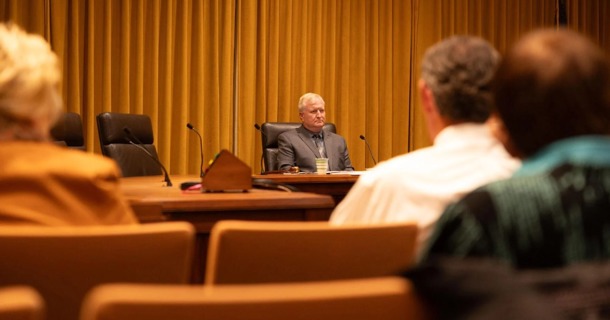Three days of ballot initiative hearings at Nebraska Capitol end with discussion on private school scholarships

LINCOLN – As early voting begins in Nebraska, debates over the future of private school scholarships persist.
This week, the Nebraska Secretary of State’s Office held hearings at the Nebraska Capitol regarding all six initiative and referendum measures appearing on the state’s general election ballot this year.
The hearings concluded yesterday with a discussion on Referendum Measure 435, which seeks to repeal a section of a bill passed earlier this year that directs public funds to be used for private school scholarships. Public testimony alternated between proponents and opponents, with 18 people speaking.
A vote to retain would keep in effect section one of Legislative Bill 1402, enacted in 2024 by the Nebraska Legislature, which provides for $10 million annually to fund education scholarships to pay all or part of the cost to educate eligible students attending nongovernmental, privately operated elementary and secondary schools in Nebraska. A vote to repeal would eliminate the funding and scholarship provisions in section one of the bill.
To qualify for the general election ballot, a referendum petition needs to collect valid signatures from at least 5% of registered voters in Nebraska and valid signatures from at least 5% of registered voters in 38 counties. According to a September press release from the Nebraska Secretary of State’s Office, the Private Education Scholarship partial referendum petition collected more than 68,184 valid signatures from at least 5% of registered voters in 60 counties.
“The right to petition the government is a fundamental right that must be honored and respected,” said proponent Rita Bennett of Support Our Schools Nebraska, a nonprofit advocating for public schools.
Bennett, a retired public school teacher and volunteer signature collector, warned that if the repeal is defeated, “We won't know how much money is being spent, how it's being spent or whether those programs are successful.” She said the repeal is necessary to keep public funds in public schools.
Legislative Bill 1402 gives $10 million to the state treasurer to distribute private K-12 scholarships and is separate from the public school budget. Ongoing funding would be determined annually by the Appropriations Committee.
Proponents of the referendum argue that the money could be used to support public schools, which they say have been losing funds. However, if the referendum passes, it is unclear whether these funds would actually go to public schools or be redirected elsewhere.
"The truth is that school choice does not get money from public schools. Rather, public school special interest groups are taking the choice from Nebraska's parents," said Jeremy Ekeler, an opponent of the repeal and executive director of Opportunity Scholarships of Nebraska, a scholarship-granting organization. “A child has a chance at a fresh start when laws like LB 1402 are retained.”
During the 2024 state legislative session, Sen. Lou Ann Linehan of Omaha, a Republican, introduced Legislative Bill 1402, establishing the funds and a scholarship system for eligible K-12 students who want to attend private schools.
State Sen. Justin Wayne of Omaha opposed the referendum at the hearing, arguing that parents deserve school options and the financial support to make a choice that works best for their family.
"Every child deserves a right to a high-quality education, not by chance, not by privilege, but by right,” Wayne said.
Eligible schools include any non-profit, privately operated elementary or secondary school in Nebraska that complied with federal anti-discrimination laws, adhered to all health and safety regulations for private schools and met accreditation requirements.
Legislative Bill 1402 replaces Legislative Bill 753, which created a private school scholarship program funded by tax credits in 2023, by changing the source of the scholarship funds. Some families have already benefited from the private school scholarships.
“When I first heard about the Opportunity Scholarship and that we had qualified, it felt like I could breathe a little more freely. Our grocery bill only gets larger due to inflation, a growing family, and it really means the world that there are people out there who care about our rights as parents,” said Katie Zach, an opponent of the referendum and mom of six children, four of which attend Cathedral of the Risen Christ School in Lincoln.
“There are people who want to give my kids access to the education that is best for them, no matter what their parents’ income might be,” she said.
But others at the hearing disagreed.
"Taxpayer funds should not, in effect, fund two schools, but rather the public system designated for public funding. Taxpayers should not have to participate in funding schools to teach mandated specific church doctrine," said Teri Hlava, a proponent of the referendum from Lincoln.
Next week, ballot initiative hearings will continue in Ogallala at the NACO West Training Center on Oct. 21 and 22. Later in the week, on Oct. 25 and 26, they will take place at the University of Nebraska at Omaha's Thompson Alumni Center in Bootstrapper Hall.
